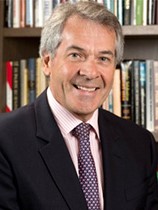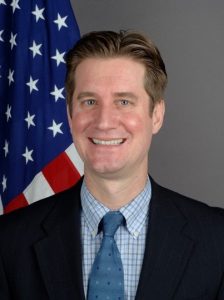As the global community continues to grapple with the coronavirus (COVID-19), the Atlantic Council is open for business. Our business, meetings, and events, however, are occurring virtually. For more information, please read an update from our President and CEO.
Event Recap
On January 15, the Atlantic Council IN TURKEY organized a webinar on the future of US-Turkey relations under the Biden administration.
The event featured a distinguished panel composed of former Foreign Minister of Spain and Atlantic Council Board Member Ana Palacio; former ambassador of the UK to the US, France and Turkey and Atlantic Council Future Europe Initiative Distinguished Ambassadorial Fellow Sir Peter J. Westmacott; former Special Representative for Syria Engagement and the Special Envoy to the Global Coalition To Defeat ISIS and former US Ambassador to Turkey James F. Jeffrey; and Centre for Economics and Foreign Policy Studies (EDAM) Chairman Sinan Ülgen. The panel was moderated by former US Ambassador to Azerbaijan and Atlantic Council Eurasia Center and Global Energy Center Nonresident Senior Fellow Matthew J. Bryza and hosted by Atlantic Council IN TURKEY Director Defne Sadıklar Arslan, who delivered welcoming remarks.
The virtual event, the Biden Administration and Turkey: Transition in bilateral relations?, bringing together experts and former officials from the United States, Turkey and Europe, took place five days before the inauguration of Joe Biden as the forty sixth president of the United States. The panel discussed how the Biden administration would approach transatlantic relations and Turkey.
Ambassador James Jeffrey commented that in his experience working in and around Turkey, he had never seen the relationship as bad as it is today. In Jeffrey’s perspective, Turkey’s purchase of the Russian made S-400 missile system has, more than anything, dealt serious harm to how Turkey is viewed in Washington, and as a result has few defenders in the US capitol. The US, for its part, is blamed for a lackluster response to the 2016 failed coup attempt in Turkey and the continuing refuge of the outlawed Gulen movement in the United States, as well as its support to the Syrian branch of the terrorist designated Kurdistan Workers Party (PKK). On the other hand, Jeffrey noted that the United States and Turkey share common approaches and interests on a broad range of geostrategic issues, from pushing back against Iran in Syria to pushing back against Russia in Libya and Syria as well as Black Sea security and NATO cooperation, and thus should be getting along much better than they are. However, Jeffrey cautioned that with the inauguration of Biden, the US-Turkey relationship stands to lose not only the close Trump-Erdoğan relationship, which has helped sustain rocky bilateral relations in recent years but also the Trump administration’s strong focus on great power competition, which elevated Turkey’s importance in the eyes of US policymakers.
Commenting on Turkey’s changing diplomatic posture, Sinan Ülgen said that what we see as Turkey’s growing assertiveness around the region will be a permanent fixture. Ülgen noted that by any measure, from GDP and international aid to diplomatic network and military power, Turkey is a nation on the rise in international affairs. This rise has coincided with a US retrenchment from the region which has left a power vacuum that Turkey has capitalized on, as demonstrated by involvement in recent years on a number of issues across the region from Syria to Libya, the Caucasus and the Eastern Mediterranean. In Ülgen’s opinion, the question and challenge facing the Biden administration is how to manage Turkey’s rise and whether it will be peaceful and cooperative or more confrontational as witnessed in disputes over the East Med in the past year. Ülgen also noted a shift in Turkey’s foreign policy messaging in the past few months to more conciliatory and less combative rhetoric which could help lower and manage tensions while still givign Turkey space to be assertive.
Sir Peter Westmacott noted the longstanding ties between the United Kingdom and Turkey, saying that while he served as ambassador in the early 2000s, the UK was one of the only advocates for opening accession negotiations with the country. Westmacott also commented that Britain’s decision to exit the European Union opens new opportunities and importance to the UK-Turkey relationship, which were able to very quickly negotiate and sign a free trade agreement into force at the end of last year. Westmacott also commented that Brexit in some ways opens the door to new opportunities in British foreign policy, particularly around Turkey, as it is no longer encumbered by the EU doctrine of member state solidarity. One area where the UK could leverage its newfound policy independence is on the divided island of Cyprus, to which the UK is a guarantor power. Westmacott also argued that the events at the US Capitol on January 6 would increase the Biden administration’s focus on democracy and human rights in US foreign policy which could create a similar atmosphere in Turkey as that which the promise of opening of EU accession negotiations created in the early 2000s. Westmacott said to that end he welcomed recent speeches by the Turkish president recommitting Turkey to a reform agenda.
Ana Palacio noted that there is a spectrum of opinion in Europe on how to approach Turkey. Palacio said she expects to see changes to EU policy after the European Council meeting in March. Palacio commented that just as in the United Kingdom, in Spain there is a strong desire to bring Turkey as close as possible to Europe, however, she noted, it cannot be brought in as a member of the European Union without meeting the criteria for membership. Palacio also said that while the US under the Trump administration has been damaging to the international order and she expects that the incoming administration will be more focused inward on repairing a very divided country, she disagrees with other European commentators who suggest that Europe needs to develop strategic autonomy from the United States. Palacio argued that the EU does not have the critical mass to separate itself and needs to find ways to continue working with the US as partners. Ms. Palacio also argued for the need for more rationality in foreign policy and called on leaders to tone down heated rhetoric which has damaged relations.
In general, while the panel, as well as the moderator Matt Bryza, identified and discussed several overlapping areas of interest and opportunities for collaboration between Turkey and the US and EU, panelists were cautious in saying this would lead improving the relationship, at least in the short term, due to the complex nature of outstanding challenges and the uncertainty regarding the new US administration’s foreign policy and approach to the region.
Event recap by Atlantic Council IN TURKEY Assistant Director Grady Wilson
Agenda
Welcoming by
Defne Sadıklar Arslan
Director, Atlantic Council IN TURKEY
Atlantic Council
Featured speakers
James F. Jeffrey
Chair of the Middle East Program, Wilson Center
Former US Ambassador to Turkey; and Former Special Representative for Syria Engagement and Special Envoy to the Global Coalition To Defeat ISIS
Ana Palacio
Board Member, Atlantic Council
Former Foreign Minister of the Kingdom of Spain
Sinan Ülgen
Chairman, Centre for Economics and Foreign Policy Studies (EDAM)
Visiting Scholar, Carnegie Europe
Sir Peter J. Westmacott
Distinguished Ambassadorial Fellow, Future Europe Initiative, Atlantic Council
Former Ambassador of the United Kingdom to the United States, France and Turkey
Moderated by
Matthew J. Bryza
Nonresident Senior Fellow, Eurasia Center and Global Energy Center, Atlantic Council
Former US Ambassador to Azerbaijan; and Former Deputy Assistant Secretary of State for Europe and Eurasia


